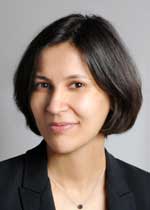Q&A: Sylvia Ratnasamy on helping students build their own networks
Newly awarded a 2012 Alfred P. Sloan Research Fellowship, Sylvia Ratnasamy, an assistant professor of electrical engineering and computer sciences in UC Berkeley’s College of Engineering, talks about her passion for improving the Internet and for helping students build their own networks.
February 15, 2012
Newly awarded a 2012 Alfred P. Sloan Research Fellowship, Sylvia Ratnasamy, an assistant professor of electrical engineering and computer sciences in UC Berkeley’s College of Engineering, talks about her passion for improving the Internet and for helping students build their own networks.
Q: What is the primary focus of your research?
A: My research is about designing simple and general building blocks by which to construct complex networks such as the Internet. For example, we showed that one can build sophisticated Internet equipment (called `routers’) using the everyday, off-the-shelf computers that we all use. That’s sort of like the Internet equivalent to using parts from a Volkwagen Beetle to build a Ferrari.

Sylvia Ratnasamy, assistant professor of electrical engineering and computer sciences and a 2012 recipient of a Sloan Research Fellowship.
Q: What are the potential benefits/applications to society that could arise from your research?
A: Modern society’s growing reliance on the Internet has been astounding. We rely on the Internet to transact affairs of work, finance, health, entertainment. However the Internet’s infrastructure was not originally designed to be highly secure or reliable, and we’re seeing the effects of this failing. If we can build the Internet from general components, then it would be much easier to add the new security or reliability features we need. If we can do so using widely-available commodity components, then the costs associated with adding these new features would be much more tractable.
Q: How do your students benefit from your research work?
A: By building networks from widely available and widely understood building blocks, we ultimately make networking technology more open to innovation. With our approach, any student with access to a computer can devise and experiment with new and interesting ways of building networks. My own students are already doing so.
Q: How has being at UC Berkeley helped advance your research?
A: In so many ways – being surrounded by top-notch students and faculty to discuss ideas with, the supportive environment for junior faculty, the respect for UC Berkeley that opens doors particularly in the tech industry, the coffee at Café Nefeli!
Q: How did you get interested in doing this work?
A: Mostly by watching the growing demands placed on the infrastructure that underlies the Internet. We’re constantly adding new applications and new users to the Internet, and the old ways of building networks just weren’t well-suited to support such diversity in use. This made me think about how we might build better networks.
Q: What’s the most satisfying part of doing this research?
A: Finding a solution to a problem that I’ve been mulling over for a long time is always the most satisfying part of research. In addition, I do believe the Internet will prove to be the key invention of my generation. The possibility of impacting the core foundation on which it’s built is just very exciting.